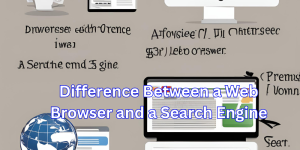What Is the Difference Between a Web Browser and a Search Engine?
In the digital age, terms like “web browser” and “search engine” are often used interchangeably, but they refer to two distinct tools that play different roles in our online experience. Understanding the difference between them is essential for navigating the internet effectively. Let’s break down what web browsers and search engines are, how they function, and provide examples of each.
What Is a Web Browser?
A web browser is a software application that allows users to access and interact with the internet. It retrieves, presents, and navigates web pages and other online content. When you enter a URL (Uniform Resource Locator) into the browser’s address bar, it sends a request to the server where the website is hosted, retrieves the content, and displays it on your screen.
Key Features of Web Browsers
- Navigation: Browsers provide address bars for entering URLs, back and forward buttons, bookmarks, and history for easy navigation.
- Rendering: They interpret HTML, CSS, and JavaScript code to render web pages correctly.
- Extensions and Plugins: Many browsers support additional functionalities through extensions or plugins.
- Security: Browsers offer security features like HTTPS, pop-up blockers, and private browsing modes.
Examples of Web Browsers
- Google Chrome: Known for its speed, simplicity, and extensive extension library.
- Mozilla Firefox: Valued for its emphasis on privacy and customization.
- Microsoft Edge: Integrated with Windows and optimized for performance.
- Safari: Apple’s browser, known for its efficiency and seamless integration with macOS and iOS.
- Opera: Features a built-in VPN and ad blocker, as well as unique tools like a sidebar for quick access to apps.
What Is a Search Engine?
A search engine is an online tool that helps users find information on the internet. It indexes billions of web pages and uses algorithms to rank and retrieve the most relevant results based on the keywords entered by the user. When you type a query into a search engine, it scans its index and provides a list of links to web pages that match your search criteria.
Key Features of Search Engines
- Indexing: Search engines continuously crawl the web to index new and updated pages.
- Algorithms: Complex algorithms determine the relevance and ranking of web pages in response to a query.
- Search Results: They provide links, snippets, and sometimes direct answers to queries.
- Advertising: Many search engines display ads alongside organic search results.

Examples of Search Engines
- Google: The most popular search engine globally, known for its powerful algorithms and comprehensive indexing.
- Bing: Microsoft’s search engine, integrated with Windows and Office products.
- Yahoo: One of the oldest search engines, now powered by Bing.
- DuckDuckGo: Focuses on privacy and does not track user activity.
- Baidu: The leading search engine in China, catering primarily to Chinese-language searches.
Key Differences Between Web Browsers and Search Engines
- Functionality:
- Web Browser: A tool for accessing and displaying web pages.
- Search Engine: A tool for finding web pages and information on the internet.
- Operation:
- Web Browser: Requires a URL to access specific websites directly.
- Search Engine: Uses keywords to search its index and provide relevant results.
- Examples:
- Web Browser: Google Chrome, Mozilla Firefox, Microsoft Edge.
- Search Engine: Google, Bing, DuckDuckGo.
- Integration:
- Web Browser: Often includes a built-in search engine for convenience.
- Search Engine: Can be accessed through any web browser.
Conclusion
While web browsers and search engines are both essential tools for navigating the internet, they serve different purposes. A web browser is your gateway to the web, allowing you to visit specific sites and interact with online content. A search engine, on the other hand, helps you discover information and websites based on your search queries. Understanding the distinction between the two enhances your ability to efficiently and effectively use the internet.

